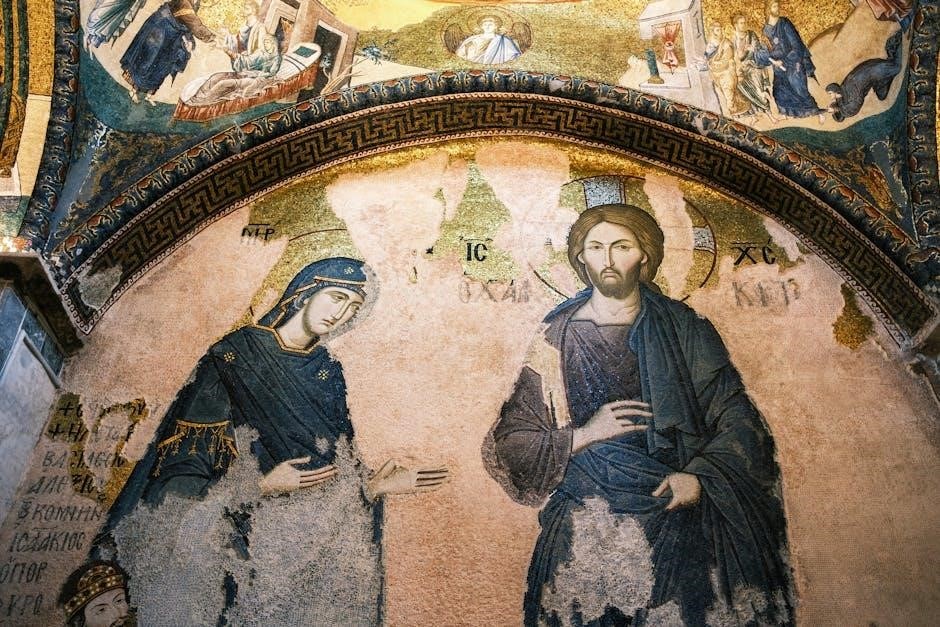The Gospel of Mary Magdalene offers a unique perspective on early Christianity‚ emphasizing Mary’s role as a leader and witness. Its PDF version is widely accessible‚ making it a popular resource for scholars and readers exploring alternative Christian narratives. The text challenges traditional views‚ sparking debates on women’s leadership and spiritual authority‚ while its translations and commentaries provide deeper insights into its theological significance.
1.1 Overview of the text and its significance
The Gospel of Mary Magdalene is a Gnostic text that presents Mary as a prominent disciple of Jesus‚ emphasizing her spiritual authority and leadership. Discovered in Cairo in 1896‚ it challenges traditional views of apostolic witness and highlights the divine feminine. Its PDF versions‚ widely available online‚ have made it accessible for modern readers‚ sparking theological debates and discussions on women’s roles in early Christianity.
1.2 Historical context and discovery of the manuscript
The Gospel of Mary Magdalene was discovered in Cairo‚ Egypt‚ around 1896 by German scholar Dr. Carl Reinhardt. The manuscript‚ part of a papyrus codex‚ was later preserved and studied. Its discovery shed light on Gnostic Christianity‚ offering a unique perspective on Mary’s role. The text‚ now housed in Berlin‚ gained prominence in modern times through its PDF versions‚ making it accessible for scholarly and public exploration of its historical and theological significance.
Historical Background and Discovery
The Gospel of Mary Magdalene was discovered in Cairo‚ Egypt‚ around 1896. Its papyrus fragments were later preserved‚ revealing Gnostic teachings. The PDF version has made the text widely accessible‚ showcasing Mary’s prominence and challenging traditional Christian narratives.
2.1 The discovery of the Gospel of Mary Magdalene in Cairo‚ Egypt
The Gospel of Mary Magdalene was discovered in Cairo‚ Egypt‚ around 1896 by German scholar Dr. Carl Reinhardt. Found in a papyrus fragment‚ it was part of a larger collection. The text‚ though incomplete‚ provides valuable insights into Mary’s role as a leader in early Christianity. Its discovery has sparked debates about women’s authority in the Church. A free PDF version with footnotes is available online‚ enhancing accessibility for modern readers and scholars alike.
2.2 The papyrus fragments and their preservation
The Gospel of Mary Magdalene survives in fragmented papyrus form‚ with pages preserved in various conditions. Discovered in Cairo‚ these fragments were later translated and compiled. Efforts to maintain their integrity ensure the text remains accessible. Scholars have meticulously studied the fragments‚ providing insights into early Christian traditions. A PDF version of the translated text‚ including footnotes‚ is available for free download‚ aiding both academic and personal exploration of this significant manuscript.
The Portrait of Mary Magdalene in the Gospel
Mary Magdalene is portrayed as a devoted disciple and leader‚ known for her spiritual insight and closeness to Jesus. Her prominent role challenges traditional views‚ emphasizing her authority and resilience in early Christianity.
3.1 Mary Magdalene as a disciple and leader
Mary Magdalene emerges as a prominent disciple‚ entrusted with divine revelations and leadership roles. The text highlights her spiritual authority‚ positioning her as a key figure in disseminating Jesus’ teachings. Her resilience and faith set her apart‚ challenging patriarchal norms and asserting her influence in the early Christian community‚ as noted in the PDF version of the Gospel.
3.2 The controversy over her role in the early Church
Mary Magdalene’s leadership sparked controversy within the early Church‚ as her prominence challenged traditional patriarchal structures. The Gospel portrays her as a visionary and teacher‚ yet her authority was often disputed by male disciples like Peter. This tension reflects broader debates about women’s roles in early Christianity‚ as detailed in the PDF version of the text.

Theological Themes and Teachings
The Gospel of Mary Magdalene explores the divine feminine and spiritual authority‚ presenting Mary as a leader with profound insights. It contains Gnostic teachings‚ emphasizing inner knowledge and the soul’s ascent‚ offering a unique perspective on early Christian theology‚ as detailed in its widely accessible PDF version.
4.1 The divine feminine and spiritual authority
The Gospel of Mary Magdalene highlights the divine feminine‚ portraying Mary as a spiritual leader with authority. She receives visions and teachings from Jesus‚ emphasizing inner wisdom and direct spiritual experience. This challenges patriarchal structures‚ advocating for women’s roles in early Christianity. The text underscores the importance of recognizing the sacred feminine in spiritual leadership‚ as detailed in its PDF version.
4.2 Gnostic interpretations and teachings in the text
The Gospel of Mary Magdalene reflects Gnostic themes‚ emphasizing secret knowledge and spiritual insight. It portrays Mary as a recipient of hidden teachings from Jesus‚ highlighting the divine within and the flawed material world. The text advocates for a direct spiritual experience‚ challenging external authority and fostering a deeper understanding of Gnostic principles. Its PDF version provides insights into these esoteric teachings and their significance.

Comparison with Canonical Gospels
The Gospel of Mary Magdalene differs from canonical texts in its resurrection narrative and portrayal of women‚ particularly Mary’s leadership and spiritual authority‚ contrasting with traditional accounts.
5.1 Differences in the resurrection narrative
5.1 Differences in the Resurrection Narrative
The Gospel of Mary Magdalene portrays Mary as the first to encounter the risen Jesus‚ emphasizing her role in spreading the resurrection news. Unlike canonical accounts‚ where male disciples dominate‚ Mary’s leadership and emotional depth are central. The text also explores her spiritual authority‚ challenging traditional narratives that often marginalize women’s roles in the resurrection story.
5.2 The role of women in the Gospel of Mary vs. the New Testament
The Gospel of Mary Magdalene elevates Mary’s role‚ depicting her as a spiritual leader and the first witness to Jesus’ resurrection. Unlike the New Testament‚ where women’s roles are often secondary‚ Mary is shown as a prominent disciple with divine authority. This challenges patriarchal norms‚ offering a feminist perspective on early Christianity. The PDF version highlights her significance‚ contrasting with traditional narratives that marginalize women’s leadership.

The Significance of Mary Magdalene as a Woman Apostle
Mary Magdalene’s role as a woman apostle challenges patriarchal norms‚ emphasizing her leadership and mission. The PDF highlights her significance for modern readers and scholars alike.
6.1 Her mission and authority in the early Church
Mary Magdalene’s mission and authority in the early Church are central to the Gospel. As the first witness to Jesus’ resurrection‚ she is entrusted to spread the message to the disciples‚ emphasizing her spiritual authority. This role challenges traditional patriarchal structures‚ positioning her as a leader in the early Christian community‚ with a divine mandate to preach and guide believers.
6;2 Challenges to patriarchal structures in Christianity
Mary Magdalene’s prominence as a woman apostle challenges traditional patriarchal structures in Christianity. Her authority‚ rooted in spiritual experience rather than hierarchical position‚ questions male-dominated leadership. The Gospel portrays her as a leader equal to male disciples‚ fostering a more inclusive view of Christian authority and inspiring modern discussions on gender equality within religious frameworks.

Modern Interpretations and Relevance
The Gospel of Mary Magdalene’s PDF version has sparked contemporary debates on gender roles and spiritual authority‚ making it a vital text for feminist theology and modern scholarship.
7.1 The Gospel of Mary in contemporary theological debates
The Gospel of Mary Magdalene’s PDF version has become central to modern theological discussions‚ particularly in feminist theology‚ as it challenges traditional views on women’s roles in early Christianity. Scholars debate its implications for understanding spiritual authority and leadership‚ emphasizing Mary’s prominence as a disciple. The text’s availability online has fostered widespread engagement‚ prompting reevaluations of gender dynamics and authority in religious contexts‚ making it a pivotal work in contemporary scholarship.
7.2 The text’s impact on feminist theology
The Gospel of Mary Magdalene has profoundly influenced feminist theology by challenging patriarchal interpretations of early Christianity; Its portrayal of Mary as a leader and witness to Jesus’ resurrection undermines traditional views of women’s roles in the Church. The text’s emphasis on the divine feminine and spiritual equality has inspired feminist scholars‚ redefining Mary Magdalene as a symbol of female spiritual authority and empowerment‚ resonating deeply in contemporary theological discourse.

The Controversy Surrounding the Gospel
The Gospel of Mary Magdalene sparks debate due to its Gnostic nature and portrayal of Mary as a leader‚ challenging traditional views of early Christianity and its legitimacy.
8.1 Debates over its authenticity and canonical status
The Gospel of Mary Magdalene is a subject of intense debate‚ with scholars questioning its authenticity and canonical status. As a Gnostic text‚ it differs from the canonical Gospels‚ leading some to dismiss it as non-traditional. However‚ its discovery in Cairo and scholarly analysis‚ notably by Karen King‚ argue for its historical relevance‚ challenging its exclusion from the Christian scriptural tradition and sparking ongoing theological discussions.
8.2 Criticisms and defenses of the text’s legitimacy
The Gospel of Mary Magdalene faces criticism for its Gnostic origins and departure from canonical narratives‚ with some dismissing it as non-traditional; However‚ defenders argue its historical significance‚ emphasizing Mary’s leadership role and spiritual authority. Its availability in PDF formats has widened its reach‚ fueling debates on its legitimacy and relevance in modern theological discussions about women’s roles in early Christianity.
Availability and Accessibility of the Gospel
The Gospel of Mary Magdalene is widely available in PDF formats‚ enabling easy access for scholars and readers. Translations and scholarly commentaries further enhance its accessibility‚ making it a valuable resource for exploring its theological and historical significance.
9.1 The PDF version and its popularity
The PDF version of the Gospel of Mary Magdalene is widely popular due to its easy accessibility and comprehensive insights. It offers a detailed translation with footnotes‚ making it a valuable resource for scholars and enthusiasts alike. The PDF’s availability has significantly contributed to its widespread use‚ providing readers with a modern and convenient way to explore this ancient text and its theological significance.
9.2 Translations and scholarly commentaries
Translations of the Gospel of Mary Magdalene in PDF format are enriched with scholarly commentaries‚ offering deeper insights into its theological themes. Works by scholars like Karen King and Jean-Yves Leloup provide extensive analyses‚ highlighting Mary’s role as a leader and the divine feminine. These resources are invaluable for both academic and personal exploration‚ making the Gospel’s teachings accessible to a broader audience while preserving its historical and spiritual significance.
The Gospel of Mary Magdalene leaves a lasting legacy‚ challenging traditional narratives and inspiring modern readers. Its PDF availability ensures its teachings remain accessible for ongoing scholarly and spiritual exploration.
10.1 The enduring legacy of the Gospel of Mary Magdalene
The Gospel of Mary Magdalene has sparked profound theological discussions‚ challenging traditional views on women’s roles in early Christianity. Its emphasis on Mary as a leader and spiritual authority continues to inspire feminist theology and contemporary debates. The text’s availability in PDF format ensures its legacy endures‚ offering insights into alternative Christian narratives and fostering a deeper understanding of Mary’s significance. Its impact remains undeniable‚ reshaping perspectives on spirituality and leadership.
10.2 Its relevance for modern readers and scholars
The Gospel of Mary Magdalene remains highly relevant today‚ offering insights into early Christian diversity and the role of women in spirituality. Its themes of spiritual authority and the divine feminine resonate with modern feminist theology. Scholars find it invaluable for exploring alternative Christian narratives‚ while readers appreciate its accessible PDF format‚ making it a bridge between ancient traditions and contemporary spiritual discourse.
